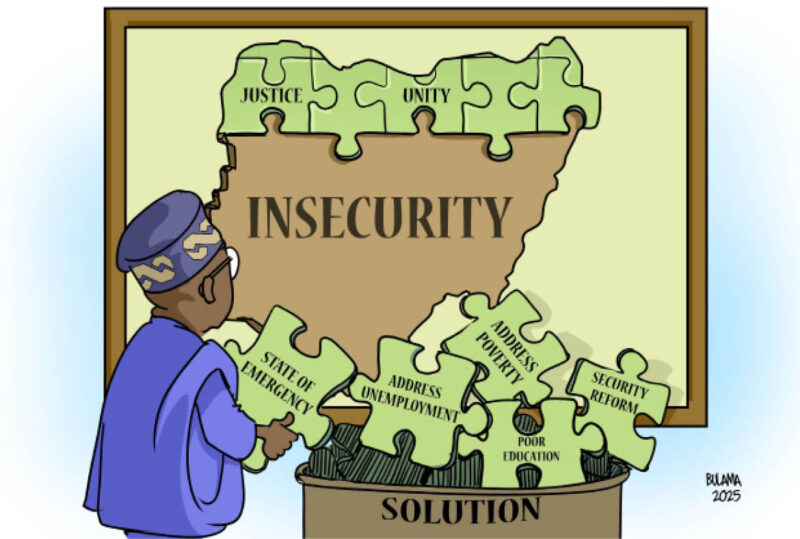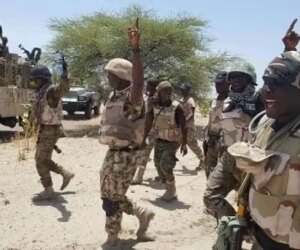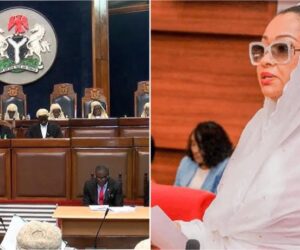Following the resurge of insurgency, banditry and other violent crimes in the last one month, in some parts of Nigeria, there have been renewed calls for the declaration of state of emergency in the affected states.
The federal government has at various times used the emergency rule to stem violent conflicts, arrest breakdown of law and order as well as ensure the rule of law in cases where groups have taken up arms against the state. But the question now is whether that is the solution to the problem, what format it will take and what other ways can be adopted to find solution to the problem.
There has been noticeable increase in cases of violent crime in the North West, North East, North Central and South Eastern parts of Nigeria with states such as Borno, Kebbi, Katsina, Zamfara, Sokoto, Kwara, Niger, Benue, and Plateau recording high and frequent cases.
SPONSOR AD
Some top military officers both retired and serving at the public presentation of a book by former Chief of Defence Staff, General Lucky Irabor (retd), titled, ‘Scars: Nigeria’s Journey and the Boko Haram Conundrum,’ were of the view that the declaration of a state of emergency is the best way to deal with the security situation in the country.
Irabor is of the view that the lack of political will to take drastic actions had hindered Nigeria’s response to insurgency. He said the proclamation of emergency backed by the National Assembly would have rallied round all elements of national power towards ending the war.
The former CDS in the book, “The government had not yet mustered the political will and instruments to declare a war against Boko Haram. With an emergency proclamation, backed by the National Assembly, there will be greater and more focused attention by the government to galvanise all the elements of national power towards the war”.
Only last month, the Northern Elders Forum (NEF) also urged President Bola Tinubu to declare a state of emergency in Northern Nigeria, citing escalating insecurity that has devastated lives, crippled economic activities, and threatened national stability.
In a communiqué signed by its spokesperson, Prof. Abubakar Jiddere, the forum expressed grave concern over what it called the “relentless wave of violent attacks, abductions, and killings” across the region, stressing that the Federal Government can no longer afford to delay decisive action.
The NEF observed that the security architecture remains inadequate, overstretched, and in some cases complicit through inaction and silence, leaving citizens vulnerable and helpless while eroding public trust in government institution and warned that if the worsening situation is not urgently addressed, communities may resort to “self-help,” which could trigger anarchy and undermine Nigeria’s democratic stability and regional peace.
Other security experts and groups support position
A group, Kwara South Youth Congress (KSYC) recently called on President Bola Ahmed Tinubu to declare a state of emergency in Kwara State following worsening insecurity in the state.
In an open letter to the president, signed by Dr Oluwatobi Afolayan, president of the KSYC, and Mr Bashir Adejare, the group’s public relations officer, the KSYC said many communities in Kwara South have been forced to relocate due to repeated bandit attacks. Some are, however, of the view that there are better approaches.
In an interview with Trust TV, Major General U.I. Muhammed, (rtd), who had worked in many hostile environments across the country, said: “It is an option. When a state of emergency was declared in three North East states in the past (Borno, Yobe, Adamawa), insecurity reduced but was not solved.
“There are many other problems that need addressing. One is proliferation of small arms and light weapons; there are millions and no one can explain exactly how many. Our borders are porous: Nigeria is 923,768 square kilometres with long land borders and 852 kilometres of coastline — about 4,047 kilometres of borders in total. Weapons come in through the sea and bush daily. If you declare a state of emergency and do not secure the borders, you will be limited in effect.
‘‘We need science and technology at the borders and committed staff to prevent weapons inflow. We must also address poverty, which is an enabler of insecurity. Government, businesses and well-to-do individuals should invest in human capital and skills to get miscreants off the streets and reduce the pool of people who can be drawn into criminality, insurgency and kidnapping,” he said.
A national security analyst and former Assistant Director, Department of State Security (DSS) Dennis Amachree, in an interview with Weekend Trust, said he supports a declaration of state of emergency in the North East and North West because of the protracted cases of terrorists’ attacks and banditry. He, however, added that the mode of implementation should vary from what obtained in Rivers State. He said he does not support the sack of democratic institutions under emergency rule.
He said, “I have always advocated for a state of emergency in the North East and North West as the protracted terrorists and bandits crises in the regions have resisted conventional military solutions.”
State of emergency
The constitution of the Federal Republic of Nigeria 1999 as amended empowers the country’s president in section 305 to declare a state of emergency in the whole country or any part thereof if the country is involved in any crisis situation caused by either human being or natural phenomena such as earthquake, floods, erosion etc. The essence of this provision is to enable the president to restore peace and order during that period of emergency after which normalcy will return.
Affected states
In Borno State, within the last one month, Boko Haram terrorists have attacked many places, targeting both civilians and security locations. The most recent major attack happened in Kirawa, a border town to Cameroon, where two people were killed, over 50 burnt including the palace of the district head.
In another night attack, the Boko Haram terrorists killed more than 60 people in Darul Jamal village, Bama Local Government Area. The insurgents who came in large number ransacked the town, carted away food items and burnt down several houses on September 5, 2025.
The Nigerian Air Force said it killed 30 militants in strikes after receiving reports of the raid on the village, where displaced residents had recently returned.
Also, the insurgents attacked a military barrack in Banki, a border town to Cameroon, where they engaged soldiers and civilians JTF for almost one hour. Weapons were said to be carted away by the terrorists. The terrorists also ambushed Civilian JTF escorting passengers on Kirawa-Pulka road, killed one and set ablaze six passenger vehicles.
Members of the Lakurawa terror group have been on the prowl carrying out attacks across Kebbi state. Many local government areas of the state have come under attacks in recent months with many residents fleeing their homes. Also in Niger, bandits have taken over many communities. They carry out frequent attacks killing residents and destroying properties. At the moment, many communities in the state have been sacked.
Katsina State has been experiencing severe attacks unleashed by bandits. Almost on a daily basis, there are reported cases. Many of the communities have been deserted just as schools and businesses have been shut. At the last count, about nine local government areas of the state have gone into peace deals with the bandits to enable the residents go to their farms and carry out other activities. Despite all these, residents of the state still live in fear as the attacks persist. In Zamfara, the case is not any different as bandits continue to attack the communities. Many schools and businesses have been shut. Also in Sokoto State, the attacks have continued. Farmers cannot go to their farms just as schools have been shut.
And in Plateau State, at least six local government areas, Mangu, Bokkos, Barkin Ladi, Riyom, Jos South, and Bassa have been experiencing attacks. Despite the deployment of security personnel in some communities, no-go areas persist within the affected LGAs, where farmers and herders are too afraid to work due to fear of attacks. The situation has become dire, with attacks and killings becoming a daily occurrence.
A fact-finding committee inaugurated earlier this year to investigate the violence submitted its report in September. The committee’s chairman, retired Major General Rogers Nicholas, disclosed that over 11,000 people, including men, women, and children, have been killed, and property worth millions of naira destroyed in 13 LGAs, including farms, cattle, and homes destroyed.
He said “We established that 420 communities across 13 LGAs have suffered violent attacks between 2001 and May 2025. The human cost has been staggering, with 11,749 lives reported lost within the period. These figures represent only those officially reported to us; we believe the actual number may be higher. Beyond the loss of lives, we documented widespread destruction of livelihoods.”
Kwara State has also been in the news over attacks by bandits despite onslaughts by the state government and troops. Many of the affected residents are still living in constant fear. A recent report by this newspaper showed that many local government areas are under attacks with residents fleeing to other areas and states for safety.
Benue is not left out as attacks have consistently hit at least 17 of the 23 Local Government Areas across the state. Our correspondent reports that Benue State continues to witness a resurgence of violence, with fresh cases of communal clashes, assassinations, and armed invasions reported despite ongoing military operations.
Resolving the situation
Several persons have said that the way to finding solution to the problem is through a state of emergency. Some of them have argued that if Rivers State could be placed under a state of emergency, same should be done with the states under attacks by bandits. But the question is; is that the solution to the problem and what form should such a declaration take? Also, has emergency solved such problem is the past and aside that, what other way can be used to solve the problem which has practically grounded many states across the country.
Indeed, various governments have taken some measures like the deployment of military in areas affected; setting of inquiries and engaging with the leaders of the affected areas but the problem persists.
Speaking on the issue, Brigadier General John Sura (rtd) suggested the use of mercenaries as the Goodluck Jonathan administration did. He said that way, neutrality will be maintained in the fight against banditry and insurgency.
Previous cases of emergency rule
In May 1962, then Prime Minister Sir Abubakar Tafawa Balewa was the first to declare a state of emergency when he suspended the Premier, cabinet, and legislature in the Western region and appointed Dr. Moses Majekodunmi as Administrator.
During President Shehu Shagari’s administration, Nigeria experienced the Maitatsine riots in four states of Kano, Kaduna, Borno and Gongola. They were later subdued and the situation did not degenerate to a state of emergency. It was under President Olusegun Obasanjo that emergency rule was revived with the declaration in Plateau State in 2004 due to the outbreak of violence. Then governor, Joshua Dariye and the legislature were suspended and General Chris Alli (rtd.) was appointed as administrator.
Ekiti State was to follow in 2006 when the then governor, Ayo Fayose and the state legislature were suspended and General Tunji Olurin (rtd) appointed sole administrator. But that case was different from the current situation as the issue then was political.
In December, 2011, President Goodluck Jonathan declared a state of emergency in Plateau over ethno-religous crisis. And a state of emergency was declared Borno, Yobe and Adamawa states following escalation of violence in May 14, 2013. But it that instance, he left the governors and state assemblies in place.
The most recent case was when President Tinubu on March 18, declared a state of emergency in Rivers State due to rising political tension and the governor, deputy, and legislature were suspended while Vice Admiral Ibok-Ete Ekwe Ibas (rtd.) was appointed sole administrator.
Many, including civil society organisations, governors and other political leaders have criticised the resort to emergency rule at any given time while some maintain that the president is so empowered by Section 305 of the 1999 Constitution.
From Ado Abubakar Musa, Hope Abbah, Makurdi; Ismail Adebayo, Birnin Kebbi; Abubakar Akote, Minna & Hamisu Matazu, Maiduguri







